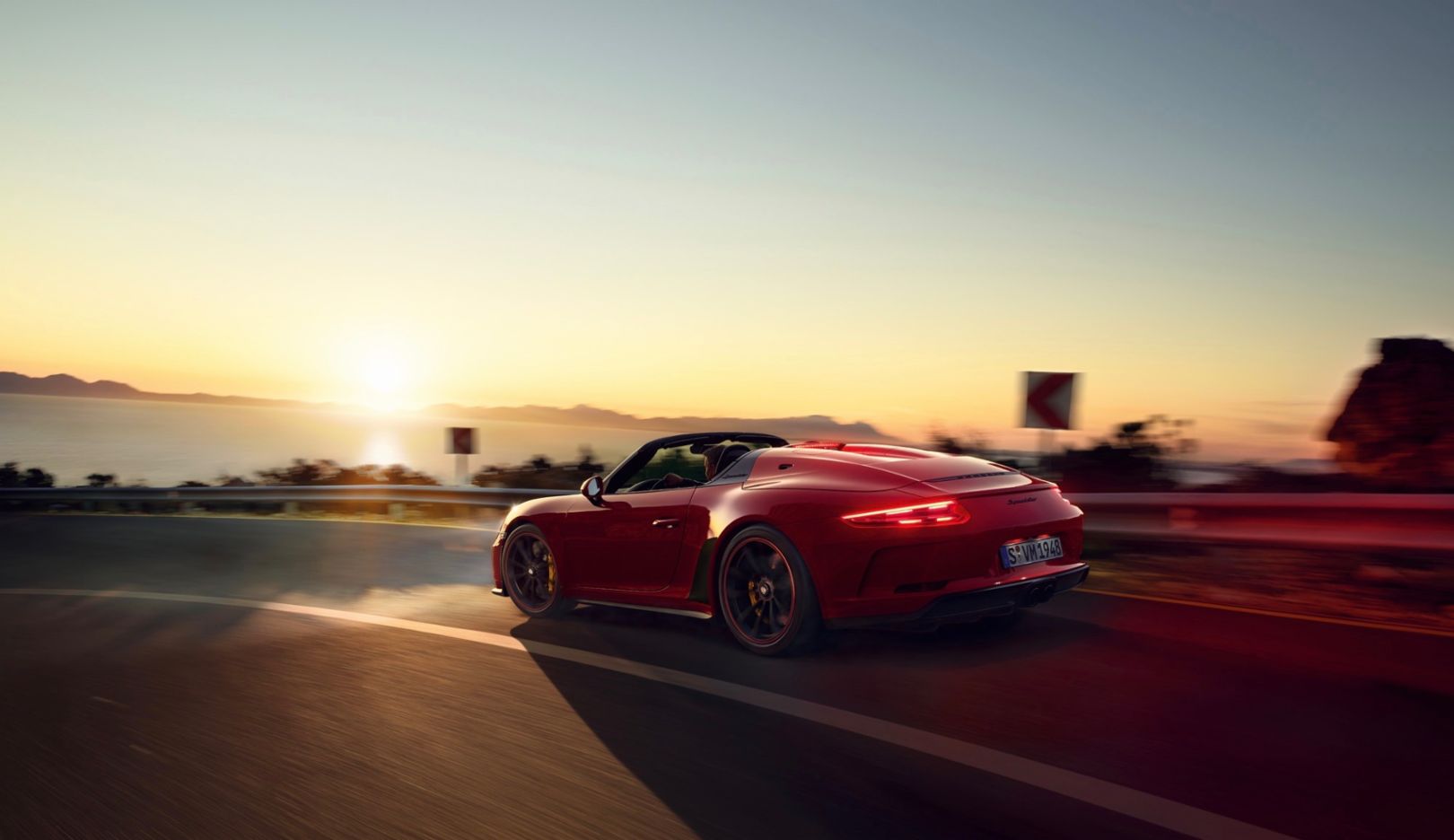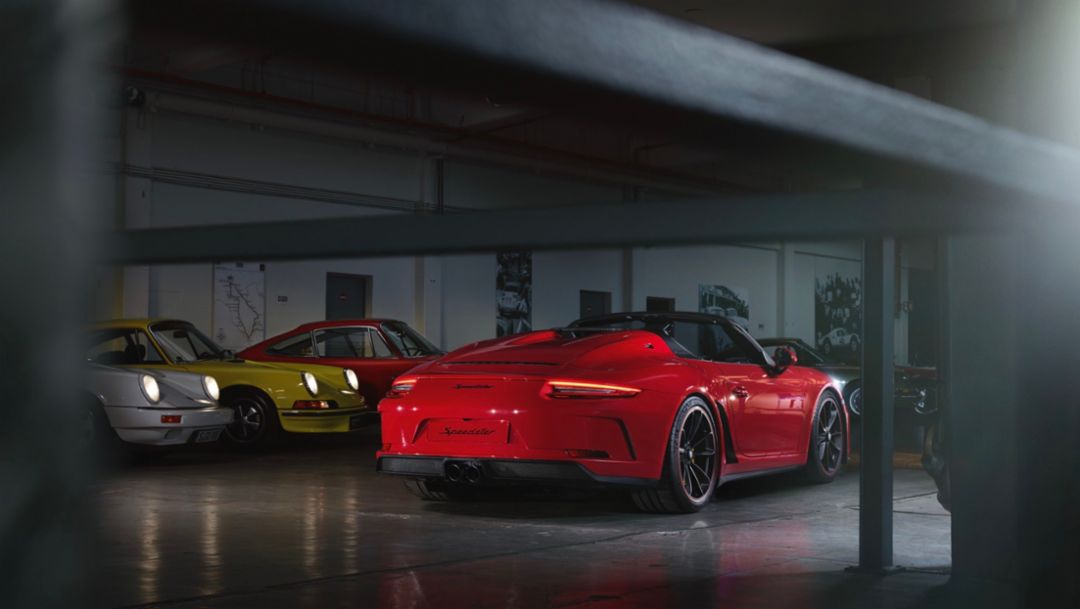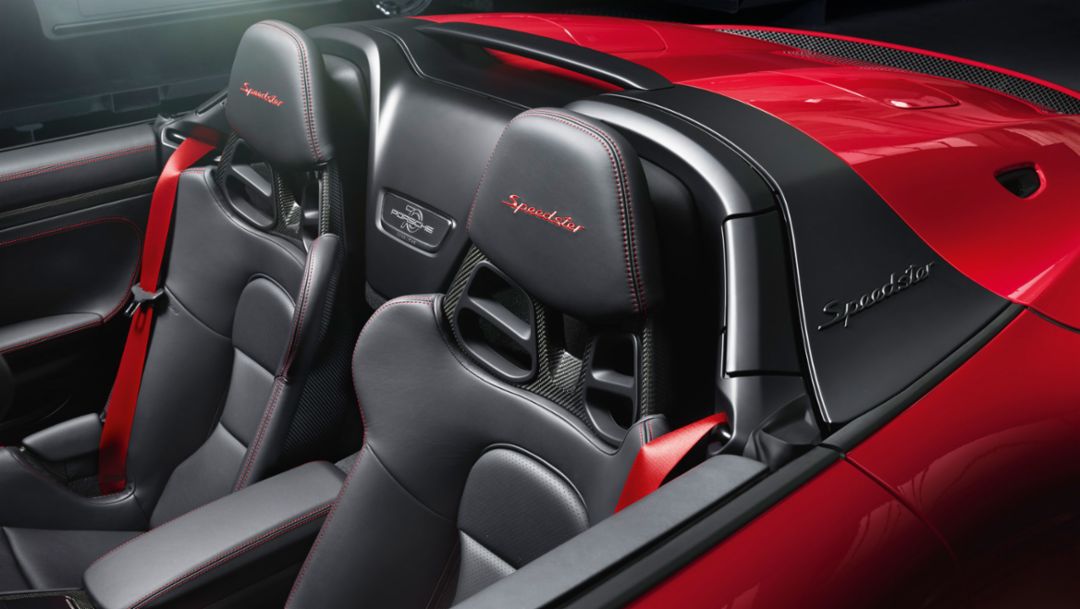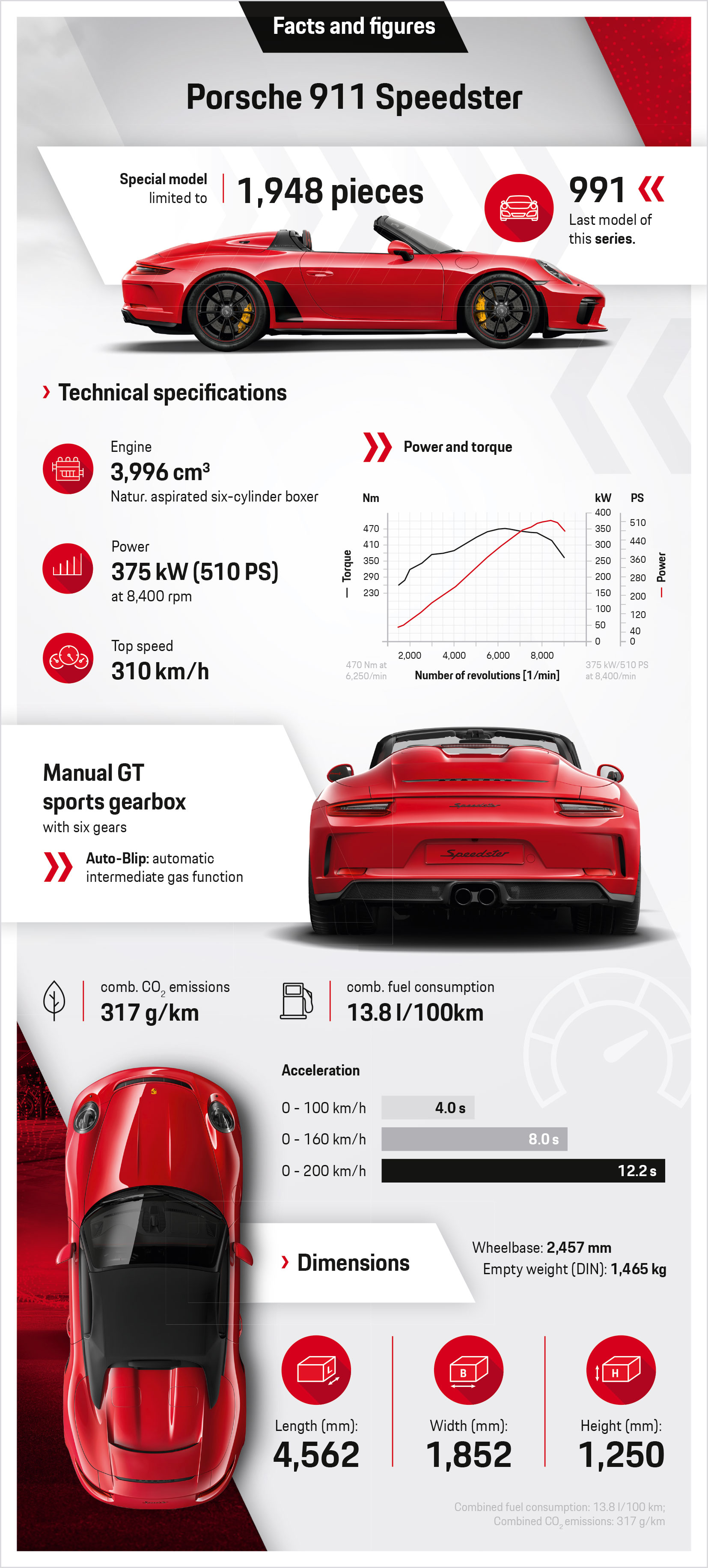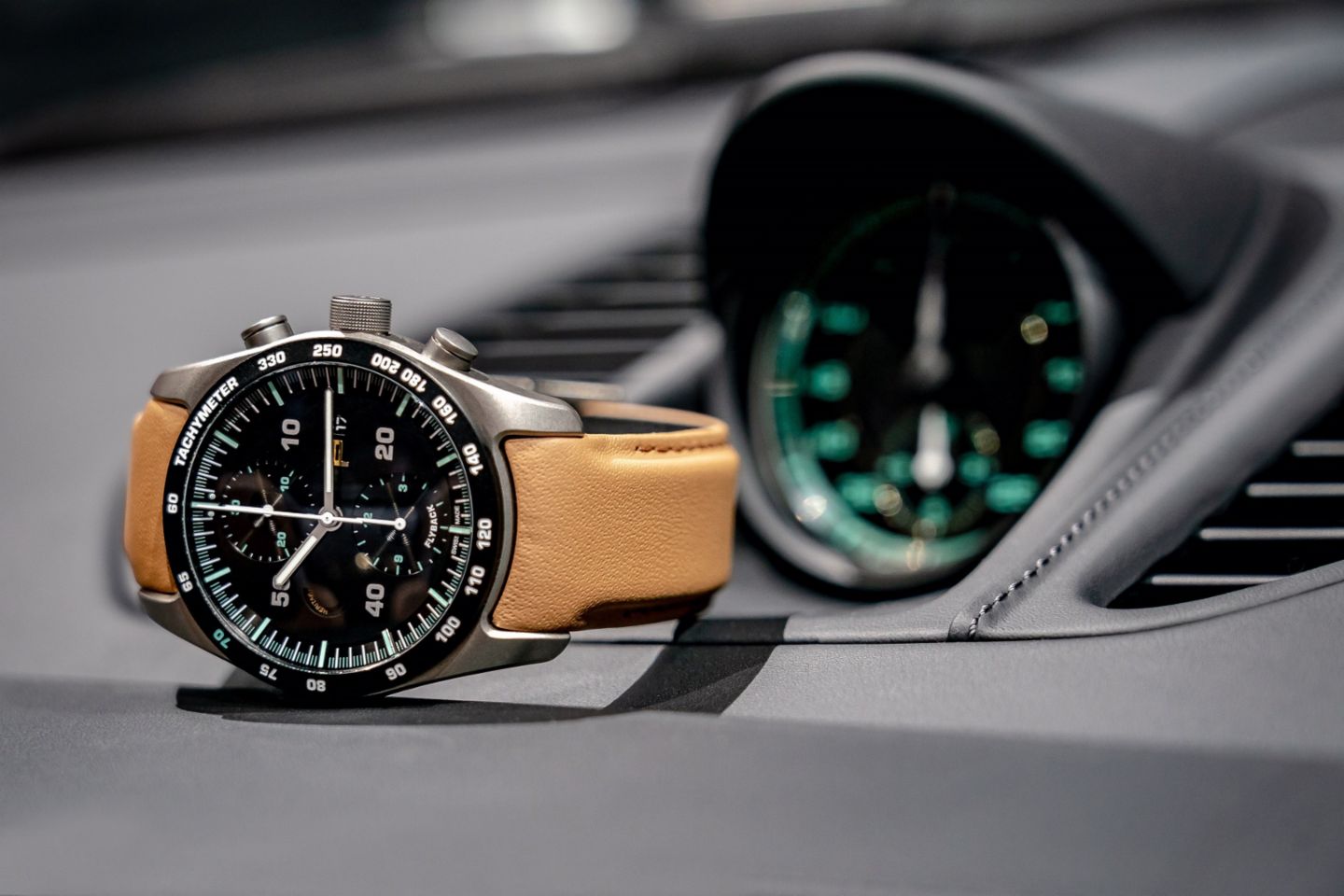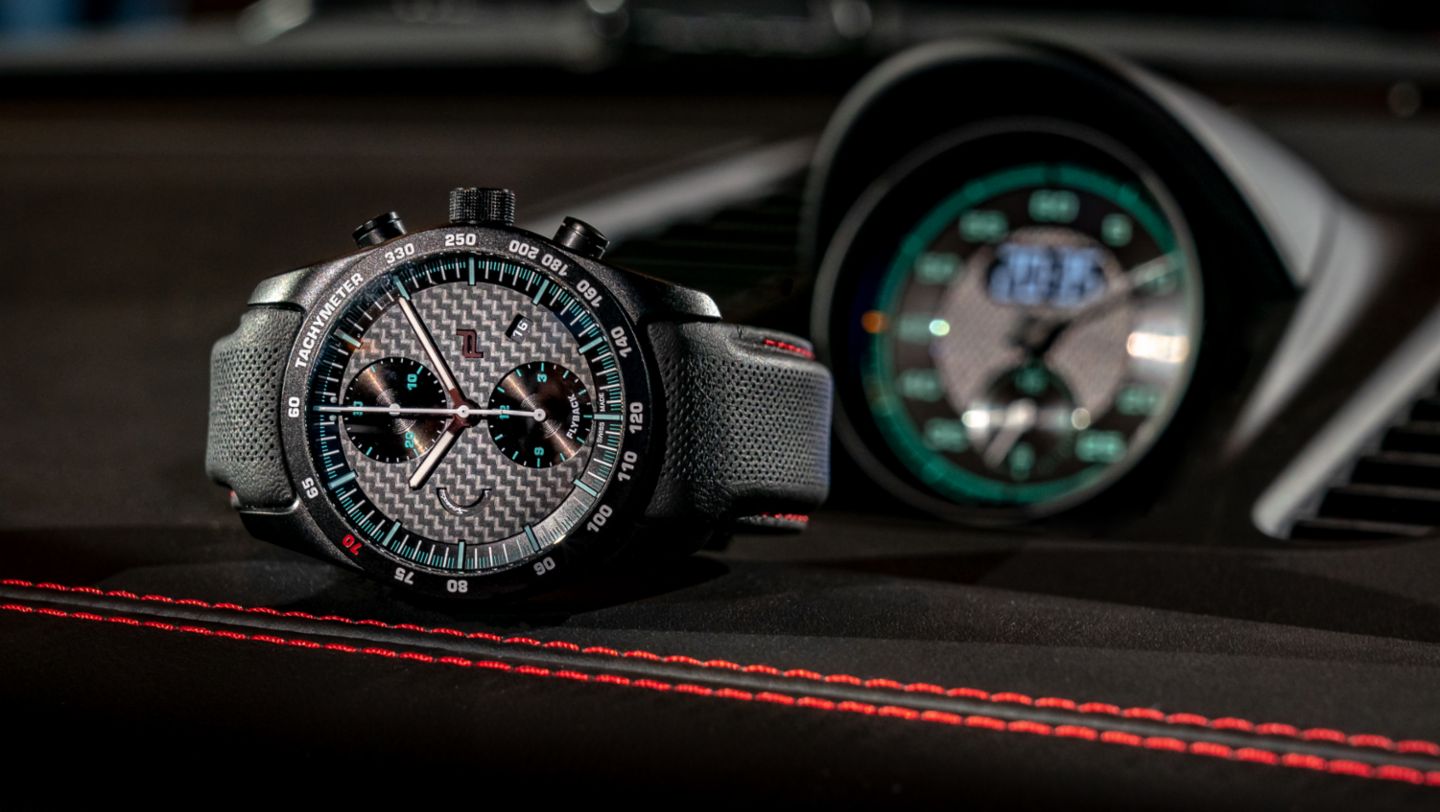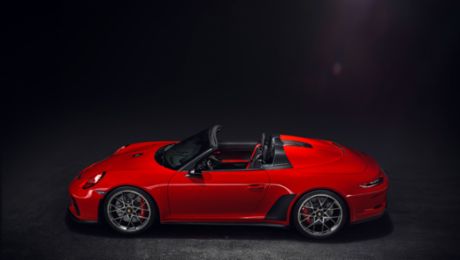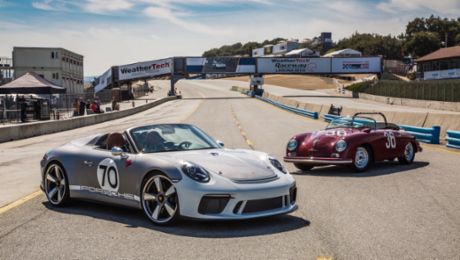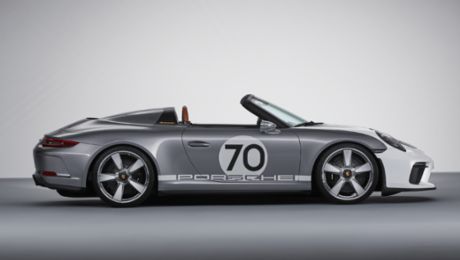The 911 Speedster combines the aspiration of a puristic, driver-oriented vehicle with motor sports technology suitable for everyday use. The 911 R (2016) and 911 GT3 served as a basis for development. A high-revving 375 kW (510 PS; Fuel consumption combined 13.8 l/100 km; CO2 emissions combined 317 g/km) four-litre naturally aspirated boxer engine delivers an emotive sound experience in the cockpit. The six-speed GT transmission is shifted manually. Visually, the new Speedster establishes a bridge to its own history – to the forebear of all Porsche sports cars, the 356 “No. 1” Roadster from 1948. The limited edition of the new 911 Speedster is also reminiscent of this vehicle. Exactly 1,948 units will be manufactured from mid-2019 at the Porsche plant in Zuffenhausen, Germany.
As a concept vehicle, the 911 Speedster celebrated its world premiere in 2018 at the ceremony for the “70 Years of Porsche Sports Cars” anniversary in Zuffenhausen. Other public appearances followed at the Goodwood Festival of Speed, the Rennsport Reunion VI in Laguna Seca, California as well as the Paris Motor Show in October. Numerous Speedster elements that characterise the concept vehicle can now be found in the same or similar design on the series production model.
Taking centre stage is the aesthetically shaped convertible top compartment lid with its double-bubble streamliners – a quintessential feature of this sports car type ever since the 911 Speedster from 1988. It is the largest and most complex component to date that Porsche has used in a road model made of a single piece of carbon-fibre reinforced plastic. Two trim elements in the double bubbles make room for the roll-over protection system as need, included in the two-seater as a standard feature just like in the 911 Carrera Cabriolet.
A weight-saving roof structure replaces the basic tonneau cover of the concept vehicle. Despite its puristic design, the fabric convertible top is suitable for everyday use. Together with the shortened window frames with their lowered cowl top panels and the smaller side windows, it gives the 911 Speedster its athletic profile. The excitingly low fly line already characterised historic designs such as the Porsche 356 Speedster from 1954.
The convertible top takes no effort to operate: the central locking hook at the windscreen frame and both the side fins of the fabric roof are released at the push of a button. The large rear lid made from lightweight carbon fibre is electrically unlocked and slides back a short distance, is then positioned by hand and makes room for the fabric roof, which folds into a Z shape behind the front seats. The cover can then be closed again effortlessly once the roof has folded into position. The roof is closed again in the same way – only the roof fins on the left and right of the streamliners have to be pressed by hand into their holders until they perceptibly engage.
Rear spoiler and rear apron of the 911 GT3 Touring
Lightweight design also dictates other body components of the Speedster. The carbon-fibre composite bonnet – which weighs in two kilograms lighter than on the 911 GT3 – and the carbon-fibre composite wings are originate from the 911 R. The front apron was borrowed from the GT3, but the front spoiler lip is a completely new development. Instead of the Talbot mirrors used on the concept vehicle, the production version of the new Speedster features electrically adjustable and heated Sport Design exterior mirrors. The extending, aerodynamically tuned rear spoiler and rear apron have been adopted from the 911 GT3 Touring for the Speedster.
The interior is characterised by black leather elements for the side bolsters and head restraints of the carbon-fibre composite full-bucket seats, the armrests in the door trims and the shortened gear lever. The centre panels of the seats are upholstered in perforated leather, while the lightweight door panels with black door pulls and stowage nets reduce the overall weight.
“Speedster” logos adorn the head restraints and the visible carbon door sills as well as the central rev counter. Like the other instruments, it has black dials with white needles as well as green digits and scales – features reminiscent of its famous forebear, the Porsche 356 Speedster. A limited-edition badge on the cross structure behind the front seats shows the serial number of the 911 Speedster, which is limited to just 1,948 units.
Porsche also optionally offers the new 911 Speedster with a Heritage Design package. Created by Style Porsche and implemented by Porsche Exclusive Manufaktur, this equipment version reinterprets classic elements from the 1950s and 1960s. This includes the interior colour scheme in Black and Cognac with golden details. Special “spears” paintwork in White for the front fascia and front wings is applied to the basic vehicle paintwork in GT Silver Metallic. Historic looking Motor sports decals for the doors and front lid complete the package. Owners can select their own maximum two-digit start numbers like shown in the photos. The Porsche crests and the gold-coloured logos correspond to the designs used in the 50s and 60s.
High-revving engine with 510 PS
The heart of the new Speedster is adopted from the 911 GT3. The naturally aspirated six-cylinder boxer engine with four-litre displacement is a pure GT engine. The peak power of 375 kW (510 PS) is reached at 8,400 rpm, with the maximum engine speed at 9,000 rpm. The engine delivers a maximum torque of 470 newton metres at 6,250 rpm. The new 911 Speedster accelerates from zero to 100 km/h in 4.0 seconds and reaches a top speed of 310 km/h.
Compared with the previous 911 GT3, the engine in the Speedster is fitted with two gasoline particulate filters (GPF) and complies with the emission standard Euro 6d TEMP EVAP-ISC (EU6 DG). However, the four-valve engine still manages ten PS more. This is due to improvements to detail such as the high-pressure fuel injectors with optimised spray pattern as well as a modified intake system with individual throttle valves, which enable a more spontaneous response to throttle commands. The newly developed lightweight stainless steel sports exhaust system weighs 10 kilograms less – including the two particulate filters.
Befitting its status as a driver’s car, Porsche only offers the 911 with a manual six-speed sports transmission. It features an auto-blip function which precisely and independently compensates differences in engine speed between the gears when downshifting through automatic throttle blips. Auto-blip can be activated at any time, in other words also independently from the chosen PASM (Porsche Active Suspension Management) variable damping system setting. A mechanical rear differential lock with asymmetric locking action rounds off sporty power transmission.
The GT philosophy behind the new Speedster is also reflected in its chassis. With its sporty rear-axle steering and dynamic engine mounts, the chassis is based on the technology of the 911 GT3 and 911 R. Control systems such as Porsche Torque Vectoring (PTV), Porsche Stability Management (PSM) and PASM with sports tuning and lowering by 25 millimetres have been precisely adapted to the new requirements. The open-top two-seater runs on 20-inch forged Speedster alloy wheels with central locks. The standard equipment includes PCCB brakes (Porsche Ceramic Composite Brake) with internally vented and perforated ceramic composite brake discs.
Chronograph
Porsche Design Timepieces has also produced special chronographs for the new 911 Speedster, likewise limited in number to 1,948: the Porsche Design “911 Speedster chronograph” and the “911 Speedster Heritage Design chronograph” can be ordered exclusively by future owners of a new Speedster model at Porsche Centres around the world from May 2019.
